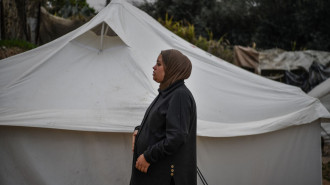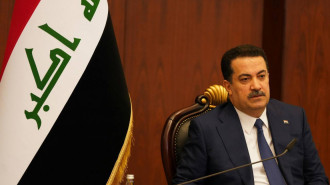Tunisian fromer minister lives in airport in protest of travel ban
Noureddin Khadmi (Khademi), a minister in Tunisia's now-dismissed government, has decided to reside with his family in Tunis' airport in protest of an "illegal" travel ban placed on him.
On 19 August, the former minister of Tunisia's religious affairs shared a picture of him sleeping in the airport's waiting seats and announced an open protest after he was denied travel for the seventh time in a row.
Tunisian authorities stormed the airport on Monday and tried to remove the former minister and his family from Carthage international airport.
"The airport security units asked me to go to the airport governorate headquarters (the police station), so I asked them for a judicial decision to prevent me from travelling. They told me that the issue was related to an issue other than the travel ban decision, given that only a passenger or accompanying traveller remained in the airport space," Khadmi told The New Arab's sister publication, Al Araby Al Jadeed.
Khadmi added that his stay at the airport is "a civilised protest" that "does not cause any disturbance to the travellers and security."
"I am waiting for the first trip to travel and to be authorised to travel, especially since there is no decision to prevent me from doing so," added the former minister.
In response, Tunisia's interior ministry said there's a legal travel ban against Khadmi.
Khadmi argued that he had never received any official paper citing the claimed ban.
Over the weekend, members of the Ennahda party, one of the leading critics of President Saied, paid a solidarity visit to Khadmi at the airport.
The ban in question is related to the S-lists procedure, namely S17, which restricts Tunisians from leaving the country. The lists are numbered 20 and came into force after the S-listing law passed in 2013 to increase border security amid a mounting wave of terrorist attacks on Tunisia.
The anti-terrorism law was declared illegal by Tunisia's administrative court in 2018 since it restricted the constitutional right of movement of hundreds of thousands of Tunisians. However, the ministry of interior has continued to apply the S-listing.
Since President Saied's power grab last year, the S-Lists have become the state's main tool to restrict opponents' movements.
Last week, Amal Al-Saidi, a member of Tunisia's dissolved parliament, was banned from renewing her passport. She was informed that her name figures in the S-lists.
The travel ban against anti-Saied figures invokes similarities with the Ben Ali era when opponents were subjected to different forms of "legal harassment" to restrict their movements.







 Follow the Middle East's top stories in English at The New Arab on Google News
Follow the Middle East's top stories in English at The New Arab on Google News


